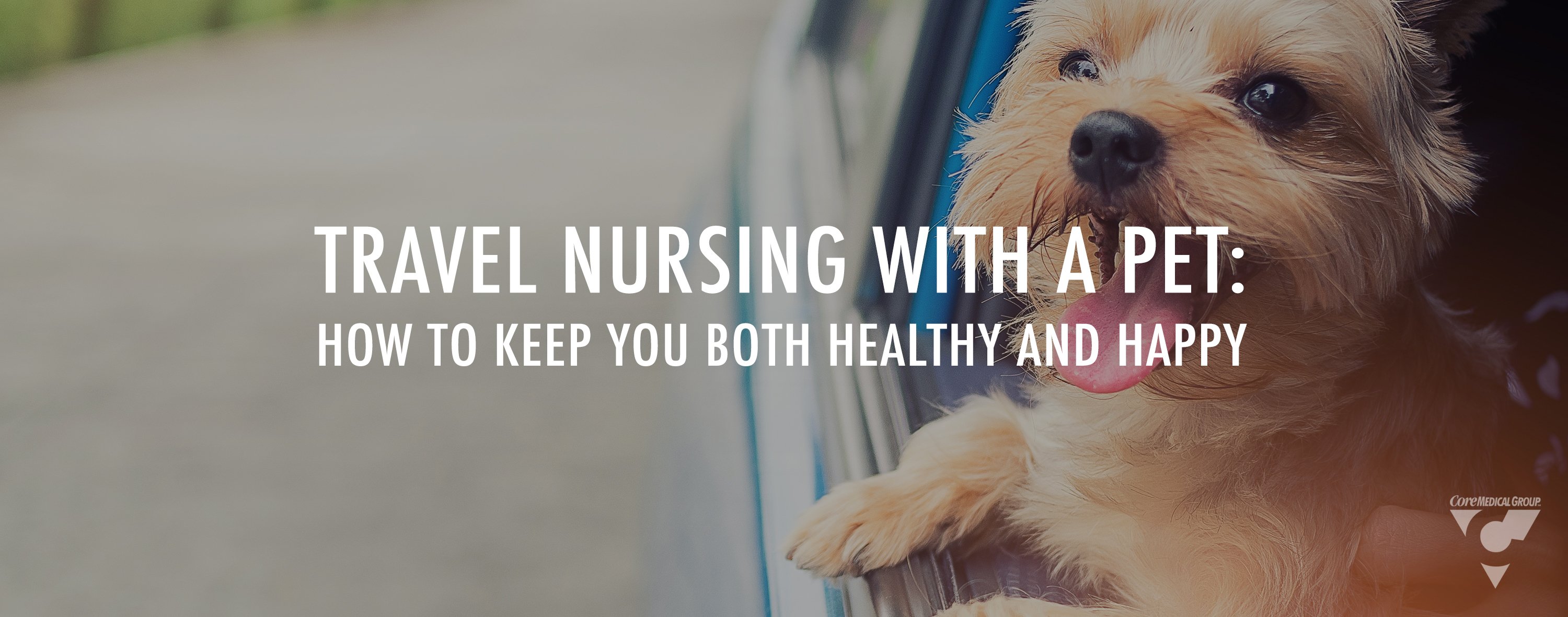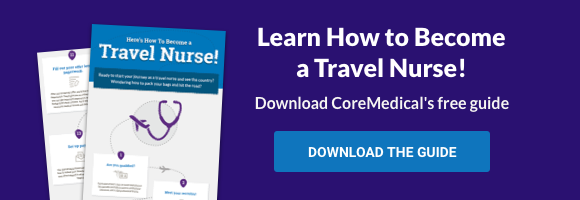
It can be challenging adjusting to the travel nursing lifestyle, but your transition will be a little easier when you travel with all the comforts of home, including your pet! Whether you’re starting your next travel nurse contract with your puppy Fido or cat Mittens, it’s essential to prepare your pet for the journey to keep you both healthy, happy travelers.
Prep Your Pet for Car Rides
1.) The first step in traveling with a pet is to make sure that they can tolerate and enjoy car rides. You won’t want to push this upon your dog or cat the day you’re traveling across the country, or you’ll risk having a terrified, potentially carsick pet in your midst. Instead, take several weeks to get your pet accustomed to the road. They’ll likely be familiar to getting in the car, or into a carrier you place in your car to head to their veterinarian, but by offering food within the vehicle (without travel), adding travel time and treats when arriving at a destination, and slowly increasing the length of the car rides, you’ll help your pet tremendously.
2.) Another issue that many do not take into account is their pet’s shyness when it comes to going to the bathroom in unfamiliar locations like rest stops or dog parks. Like ride training, this is something that can be practiced with a simple command and reward method before your journey. Tell your puppy a specific phrase that signals it’s time to go, like “let’s go outside” or “time to go,” right before they eliminate and reward with a treat after. Start in your own backyard, then use the phrase on walks in the neighborhood, and finally at other locations a longer distance from home to help your pet get acclimated.
3.) The last tip for prepping your pet for car rides is to invest in high-quality pet carriers and/or crates as well as a harness, pet seat belt and/or car barriers. You may want to follow the same slow introduction rules as above. While many animals, dogs in particular, are accustomed to riding in the front seat without any restriction, the invention of pet barriers and safety devices could save the life of your pet if you were to get into an accident. Plus, you have more freedom letting your pooch look out the window knowing they’re securely fastened inside the car.
Here are a few options of pet seat belts and secure pet booster seats:
- URPower Upgraded Dog Seat Belt
- Vastar Adjustable Dog Cat Car Seat Belt
- iBuddy Dog Seat Belts for Cars
- Henkelion Upgraded Dog Booster Seat
- AmazonBasics Pet Bucket Booster Seat
- K&H Bucket Booster Pet Seat
Make Sure Your Pet is Healthy
Once your canine or feline family member is prepared for the ride, it’s time to make sure they are healthy enough for travel. Schedule a check-up for your pet a couple weeks before you’re ready to hit the road. Make sure they’re up to date on all vaccines and shots. This is also an ideal time to start a new round of flea and tick medication, especially if you plan on exploring the outdoors with your pet.
Like their human owners, some pets experience car sickness and can’t help feeling agitated and uncomfortable. Even if your pet doesn’t vomit, it’s important to look at signs like drooling, trembling, or a hunched posture.
If you notice any of these, talk with their veterinarian about certain medications that could calm your pet’s stomach and assist with an uneventful ride.
While it is vital that your animal wears a collar and at least a tag with your phone number on it, it might be a good time to consider getting your pet microchipped for added security. Microchips are about the size of a grain of rice and are implanted just below the skin, between your pet’s shoulder blades. It’s a quick injection, similar to a shot, and does not require anesthesia. It can be a lifesaver if your animal escapes in an unfamiliar neighborhood without a collar or loses their collar easily.
It should be noted that several states also require your animal to have an up-to-date Certificate of Veterinary Inspection - also known as a CVI or interstate health certificate. This should be provided by a licensed, federally accredited veterinarian and basically confirms that your animal is healthy and does not show any signs of transmittable diseases. You can take a peek at what each state requires for your dog, cat, or other animals at the USDA APHIS website.
Create a Smooth Transition
Now that you have a healthy, happy pet who is excited to travel with you, it’s time to make the transition to your next travel nursing jobs as smooth as possible. According to PetTravel.com, “It is very common that pets get sick because of the water they drink. […] They have been used to drinking one type of water, and now suddenly you give them something else. [...]You can take water from home with you so as not to face digestive issues like this.” It’s a good idea to ease them into a change of water just as much as if you were to transition them to a new brand of food.
You’ll also want to do your research and find the closest emergency animal hospital and available veterinarian to your new travel nurse housing arrangements. Not all vet offices are open to accepting new pets, and it’s important to let them know your travel status, as that may mean the difference between whether they receive your animal as a new patient or not. This is also a great time to invest in pet insurance. CoreMedical Group offers pet insurance as one of our many travel nursing and therapy benefits, and it can really make the difference if your furry (or scaly) friend needs extra medical attention or multiple rounds of medication.
Finally, you’ll want to animal-proof your new housing and make sure that your dog or cat cannot injure themselves – or cause a raucous – with anything in your new space. According to the ASPCA, “APCC [the ASPCA’s Animal Poison Control Center] receives numerous calls about pets finding a pill or two left on the floor by a previous occupant,” and curious kittens are often rescued from ceilings, bathroom vanities, and other hidden holes in walls, mattresses, etc. Take a moment to get a “pet’s eye view” from their level and look for anything that could pose a problem, including at any hotel or Airbnb you plan on stopping at along the way to your travel therapy or nursing destination.
With all the precautions checked and travel training in place, your fur babies will be on to new adventures in no time! If you’re ready to pack the car and head to your next destination, let CoreMedical Group help you find your dream opportunity!
